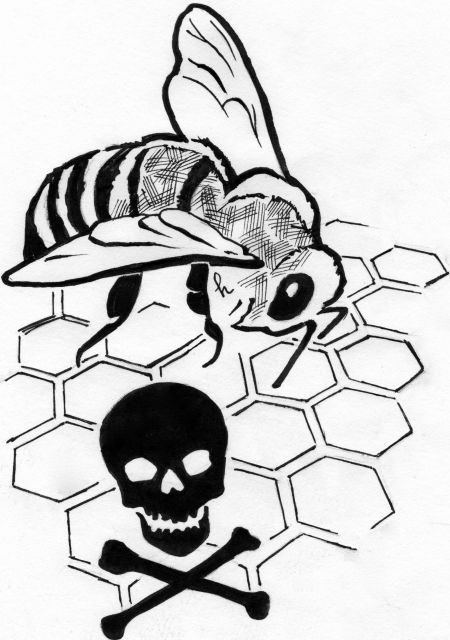OTTAWA–Following massive collapses in bee populations across Ontario and Quebec in 2012, beekeepers and environmental groups are calling on the Canadian government to follow the lead of the European Union (EU) and limit pesticide use. A recent decision from the European Commission imposed a two-year ban on three kinds of chemical pesticides known as neonicotinoids, which attack the nervous systems of bees and other insects.
“There [are] good beekeepers that have lost 70 per cent of their hives over the last winter,” said Dan Davidson, a third-generation beekeeper and president of the Ontario Beekeepers’ Association. He expects Ontario’s beehives to suffer losses well above an acceptable level once again this year.
More than 230 different beehive populations in Ontario alone reported losses in 2012. The losses ranged from 20 per cent collapse, eight points higher than the yearly expected average, to complete collapse, wiping out entire bee colonies. The trend is troubling for farmers as well as beekeepers, as bees play a crucial role in crop pollination worldwide.
Despite positive correlations established in scientific studies in Quebec and Europe, Health Canada does not consider the evidence strong enough to link the bees’ decline with the use of neonicotinoids.
"The 2012 bee incidents will be considered as part of the re-evaluation…. If warranted, regulatory action will be taken at any time to further protect pollinators," said Mary Mitchell, co-chair of Health Canada's Pesticide Management Regulatory Agency, in a statement to CTV and the Vancouver Sun.
Davidson doesn’t think waiting for further evidence is a sound strategy. “All they [Health Canada] have to do is read their own registration documents on these insecticides and there is enough information there to highlight the risks,” he told The Dominion.
Neonicotinoids have been used for over a decade to produce higher yields in corn, wheat and other crops. Seeds are treated with the pesticides before planting, and the chemicals become incorporated into the composition of the adult plant, including its pollen and nectar. Being extremely water soluble, the pesticide is transferred to bees not only through the nectar but also through contaminated water sources.
"These are supposed to just kill the insects that attack the plants you’re trying to protect, but that’s not the case,” said John Bennett, the Sierra Club’s Executive Director. “They’re getting into the environment and they’re killing insects of all kinds, especially pollinators.”
Part of the problem is that pesticides containing neonicotinoids went from brand new to ubiquitous in less than two decades. “They weren’t widely used when they first came out,” Davidson said. “Now you can’t even buy seeds without them on.”
Studies show that the impact of this type of pesticide increases as it accumulates in soil. “It doesn’t break down; it has a half-life of three years and it might take as many as twenty years to break down in the soil. So if it is used year after year on all the acres and just accumulating... that’s why we’re seeing its effects now and weren’t before,” Davidson told The Dominion.
The Sierra Club of Canada is currently lobbying the Canadian government to ban neonicotinoids outright. According to Bennett, not only is the evidence compelling, but the government should be taking a precautionary position even in the absence of conclusive evidence.
“[Health Canada officials] support the use of these chemicals and they’ve decided to respond to it as though last year’s die-off was an anomaly,” he told The Dominion in a phone interview from Ottawa. “The European Union has come to a different conclusion [by] looking at the same science.”
Bennett believes the government’s decisions have been influenced by lobbying from the chemical industry. “They chose to protect the chemical farming industry instead of protecting farming in general," said Bennett.
In a similar vein, beekeeper Dan Davidson suggests that despite some farmers' opposition to the ban, they have just as much to lose as beekeepers if the pesticides continue to be used: “It is a known fact that a third of our food comes from pollination, so if the bees go so will... everything that requires pollination. We’d have to live on corn and wheat.”
Crystel Hajjar is a journalist and organizer in the climate justice movement. She writes on social, political and environmental issues.



